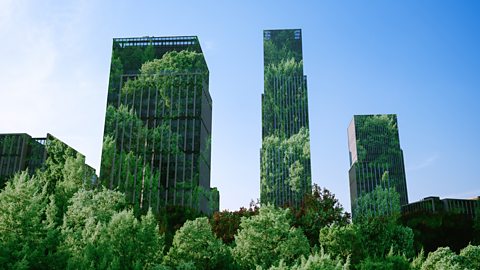Key facts about the ethical implication of business growth
Ethical business growth: Must be morally correct and considerate of people and the planet.
Social implications: Business growth affects customers, staff, suppliers, local residents, and councils, with both potential benefits and harms.
Environmental implications: Business activities impact the environment through resource use and waste production; businesses can conduct green audits to measure their impact.
Government regulations: The Competition and Markets Authority (CMA) ensures effective competition to benefit consumers, preventing monopolies.
The ethical implication of business growth

What does it mean to be “ethical”?
The Oxford English dictionary defines being ethical as “Avoiding activities or organisations that do harm to people or the environment”.
So to be ethical, business growth must happen in a way that is morally correct/considerate of people and the planet.
What are the ethical implications of business growth?
Growing businesses need to consider how their ongoing growth will impact society and the environment, both positively and negatively.
Business growth: social and economic implications
Social means “to do with society” and society is just made up of people!
Therefore: social implications of business growth just means: how are people affected if a business grows?
Consider the various people outside of a business that could be affected by that business growing:
| Stakeholder | Potential benefit of growth | Potential harm from growth |
|---|---|---|
| Customers | Faster innovation: new or improved products being made as the company increases capacity | Could quality of products suffer if the business tries to mass-produce them, or maximise profitability by reducing cost of materials? |
| Staff | More job security, maybe more income (eg overtime for working more hours) | Can they cope with the pressure? And are they being paid a fair wage? |
| Suppliers | More orders for supplies, so higher sales and profits? | Can they keep up with demand? And are they being paid a fair price by the business? |
| Local residents | There may be opportunities for local people to get jobs at a growing business. | There may be more congestion (eg delivery vans and lorries) and maybe noise pollution from a noisy factory. |
| Local council | More sales and profits should lead to more rates (council tax) being paid to the council, to help them provide services like waste collection and recycling. | The council may receive large numbers of complaints from irritated local residents. |
Business growth: environmental implications

How does environmental considerations influence business activity?
Any business activity will have an impact on the environmentThe immediate surroundings in which people live, or the natural world such as the land, air or water., either through the natural resourcesMinerals that have been made through the formation of the world that can be used for human benefit. that it uses or the waste productsIn chemistry, these are by-products in a chemical reaction formed as well as the desired product. They are described as waste products if no use can be found for them. In general terms, they can be unwanted or unusable material, including household rubbish, hazardous materials (eg toxic waste) or bodily materials (eg urine or faeces). that it produces.
A business can carry out a green auditAn assessment of a business’ activities its impact on the environment. in order to measure the environmental impact of its activities. For example, this may involve measuring its carbon footprintA measure of how much carbon is used through the activities of a person, company or country.. The four main environmental issues that are most likely to influence the activities of a business are climate change, pollution, sustainability and waste reduction.

What is climate change?
climate changeThe long-term alteration of weather patterns. refers to long-term changes to weather patterns. Scientists believe that business activity contributes to this global warmingThe rise in the average temperature of the Earth's surface. through the burning of fossil fuelsNatural, finite fuel formed from the remains of living organisms, eg oil, coal and natural gas. and the cutting down of trees.

What is pollution?
pollutionContaminating the air, water or ground with harmful substances. commonly refers to the contamination of air or water with harmful chemicals.
Air pollution can cause a number of health-related issues.
Animals and plants that live in seas and rivers are affected by water pollution.
Business activity may also cause disturbance through noise pollution.

How can a business be more sustainable?
Working in a sustainableAble to be maintained at a certain rate or level way means that business activity does not use up or destroy natural resources. To achieve this, a business may use renewable energyPower that is generated using natural resources that will not run out, eg wind and wave power., recycle materials such as paper and ink cartridges, or use devices that save energy and water.

Why should a business reduce waste?
Traditionally, waste has either been incineratedBurned, particularly at a high heat. or sent to landfill sitesPlaces where refuse is buried underground.. However, these are not environmentally friendly ways of dealing with waste.
Instead, businesses can reduce the amount of waste that they produce, which reduces costs and means that there is less waste to dispose of. Many businesses also look for ways in which waste materials can be reused.
Benefits and drawbacks of being environmentally friendly?
What are the advantages of being environmentally friendly?

Being environmentally friendly can bring a number of benefits. For example:
subsidiesMoney given by the government or organisation to help a business keep the price of a product or service low. and grantsMoney given to help a person or company that does not have to be paid back. Governments may give grants to encourage businesses to set up in particular locations. – The government offers money to businesses willing to investTo put money into something in order to make a profit. in environmentally friendly production methods. This can help to reduce costs.
Lower costs – Changes to business activities that lower a business’ impact on the environment can often also lower the business’ costs. For example, retailer Marks and Spencer has introduced driver performance software in its delivery vehicles that has reduced the consumption of fuel by 2.3 litres per hour.
Increased sales – Concerned customers who are very aware of environmental issues are more likely to buy from businesses that act in an environmentally friendly way.

What are the disadvantages of being environmentally friendly?
For a business, there may also be disadvantages to being environmentally friendly. For example:
Increased costs – Producing goods in an environmentally friendly way can often mean spending more money initially, as it can require research and investment in new production methods.
Time consuming – Becoming environmentally friendly can take up a lot of time, particularly in large businesses.
Potential for inaccurate claims – A business that wants to use claims about its environmental efforts must make sure those claims are accurate. Inaccurate claims can cause significant damage to the reputation of a business.
What are government regulations for business growth?
The government wants to make sure that there is effective competition between different businesses, as this means customers get a better deal. Giving consumers choice of where to shop and who to buy products from. This tends to lead to lower prices and better quality products.
The government body which works to promote competition between different businesses is called the Competition and Markets Authority (CMA).
The CMA investigates mergers between businesses, to check that no single business becomes too dominant in any one market. This is because some mergers are so large, they reduce competition (this is known as a MONOPOLY) and set high prices for customers, knowing customers can’t get the product anywhere else.

Try this case study questions
The UK’s Competition and Markets Authority (CMA) has stepped in to review a proposed takeover that could reshape the smart home market. Mega-tech giant Zonix, known for its vast range of online products and services, announced its $1.5 billion bid for small tech company SweeperBot, a pioneering maker of smart robotic vacuums.
The CMA is examining whether the deal would lessen competition, potentially impacting innovation and choices for UK consumers. The watchdog is concerned that Zonix’s entry into the smart home appliance sector through SweeperBot could give it a significant advantage, allowing it to bundle services and dominate the robotic cleaning market.
Zonix and SweeperBot have promised to work “collaboratively” with regulators. This isn’t Zonix’s first run-in with the CMA, which is also probing Zonix's practices in online retail, including issues around third-party sellers and online reviews.
Question 1
Why is the UK's Competition and Markets Authority (CMA) reviewing Zonix's planned takeover of SweeperBot?
The CMA is reviewing Zonix's planned takeover of SweeperBot to determine whether the deal could lead to a substantial lessening of competition in the smart home appliance market.
Question 2
What are the potential consequences of Zonix's acquisition of SweeperBot for the smart home appliance market?
The acquisition could potentially give Zonix greater control and influence in the smart home appliance market, possibly reducing competition and making it more challenging for other companies to compete.
Question 3
Besides the SweeperBot takeover, what other investigations is the CMA currently conducting involving Zonix?
The CMA is also investigating Zonix for its handling of fake online reviews and suspected anti-competitive practices in how it manages third-party sellers on its platform.
Try the ethical implications of business quiz
Final checks
What is a potential negative impact of business growth on local residents?
A potential negative impact of business growth on local residents could be increased congestion and noise pollution.